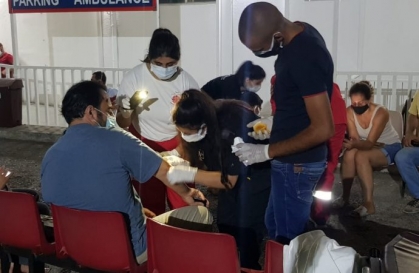After last week’s catastrophic explosion in Beirut killed more than 150 people and left thousands of others wounded and homeless, governments and charity organizations throughout the world are rallying to send support to a country on the brink of collapse.
On the evening of Aug. 4, a massive explosion rocked the port of Beirut, with the shockwave felt throughout the city. Numerous videos of the event circulated on social media displayed a large mushroom cloud rising and spreading over the port area. Initial reports find that the cause of the blast traces back to some 2,750 tons of ammonium nitrate, commonly used as fertilizer or in bomb making, which had been stored unsafely inside of a warehouse and which caught fire.
Large swaths of Beirut’s port area were wiped out by the explosion, leaving countless people without jobs or homes in a country already devasted by the coronavirus and a crippling economic meltdown.
While some Lebanese lawmakers have suggested the explosion could have been caused by “external intervention” by a missile or bomb, several high-level officials, including Lebanese President Michel Aoun, acknowledged that the stockpile of ammonium nitrate had been in the port for years, but nothing had been done with it.
On Aug. 5, a day after the blast, Maronite Patriarch Cardinal Bechara Boutros Rai, President of the Conference of Patriarchs and Catholic Bishops of Lebanon, issued a plea for help, saying the incident has “turned Beirut into an apocalyptic city…leaving people feeling hopeless and helpless.”
“Hundreds of families are homeless. All this is happening and the state is in an economic and financial situation which makes it incapable of dealing with this human and urban catastrophe,” he said, noting that “This country is at the verge of a failed state and total collapse.”
He urged both prayers and support, calling on all nations and people of goodwill “to stand in solidarity with the Lebanese. We hope and pray Lebanon will regain stability and initiate a path of recovery toward peace and justice for all.”
Numerous charities throughout the world have been quick to jump in, sending emergency funds in the days after the blast and launching fundraising campaigns for long-term assistance as the country tries to get back on its feet.
On Friday the Vatican announced that Pope Francis, through his department for Integral Human Development, has already sent nearly $300,000 in aid to Lebanon, as a sign of the pope’s “attention and closeness to the affected population and of his fatherly closeness to people in serious difficulty.”
According to a Vatican press release, the money was sent to the Vatican embassy in Beirut and will be distributed to medical facilities and shelters for the displaced run by the Lebanese branch of Catholic charity organization Caritas International, as well as several partner offices.
Catholic charity Aid to the Church in Need (ACN) has also chipped in with almost $300,000, and they have launched a campaign to raise more money.
In a statement, ACN’s Lebanon expert Father Samer Nassif said the Christian area of Beirut was “completely devastated,” leaving some 10 churches destroyed, 300,000 people homeless, and countless others whose livelihoods have been “totally destroyed.”
“In one second, more damage to the Christian quarter of Beirut was done than throughout the long years of the civil war,” he said, adding, “We have to build it again from the ground up.”
Catholic news outlet AsiaNews has also started a campaign called “Help Devastated Beirut” to raise funds “in order to help the people of Beirut and Lebanon,” proceeds from which will be sent to Caritas Lebanon.
The Federation of Evangelical Churches in Italy is also offering assistance through their program for migrants and refugees, Mediterranean Hope. They have launched a fundraiser to assist with healthcare and sanitary needs; families who are struggling due to the explosion; and medical facilities that were damaged as a result of the explosion.
In the United States, the organization In Defense of Christians, the country’s leading advocacy group for Christians and other religious minorities in the Middle East, praised American President Donald Trump and French President Emmanuel Macron for stepping up to support Lebanon “in their hour of need.”
Trump has pledged $17 million in aid to Lebanon through the U.S. Agency for International Development. In a visit to Lebanon after the blast, Macron pledged France’s support by sending urgent aid to Lebanon but insisted that such help would be useless unless the country’s leaders implement reforms.
The European Union has released 33 million euros, roughly $40 million, to assist Lebanon, and numerous E.U. countries have already chipped in. Italy has sent specialists, firefighters and more than eight tons of humanitarian aid to Beirut. Iran has also pledged aid, as has Israel, though the latter’s offer is unlikely to be accepted given the sporty history between Israel and Lebanon, who have no diplomatic ties.
The World Council of Churches, an ecumenical umbrella group consisting of some 349 member-churches, has sent their condolences, as have countless other figures in both the Catholic Church and other Christian organizations.
Archbishop Pierbattista Pizzaballa, apostolic administrator of the Latin Patriarchate of Jerusalem, has promised to pray for victims of the explosion during Sunday Masses on Aug. 9 and Aug. 16. Offerings from collections taken up during Masses on those Sundays, he said, will be sent to the Latin Apostolic Vicar of Beirut, Bishop Cesar Esseyan, to be “given to the Lebanese population.”
“May the Lord welcome all the victims into His embrace and console and support those who are in pain,” he said in his statement.
Source: signis.net






